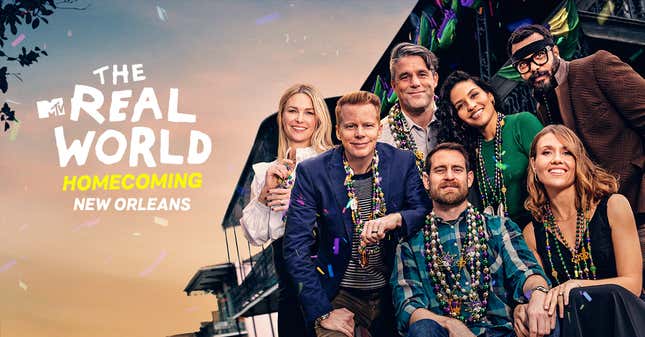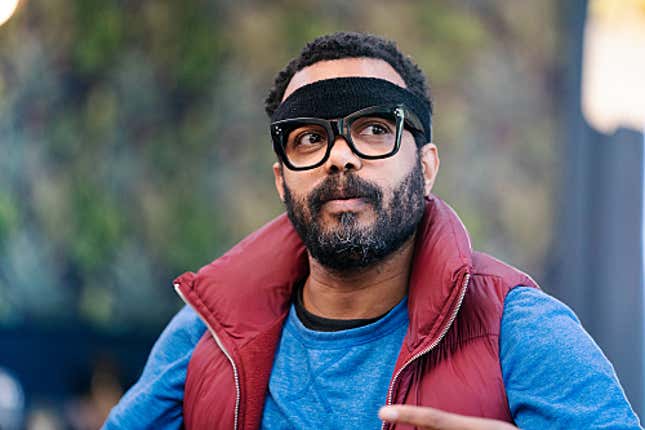
As a person of a certain age, my relationship with reality TV differs from most.
Shows like Married at First Sight or The Real Housewives of Wherever the Hell aren’t really my ministry, in part, because I have more important things to watch—like the inside of my eyelids. But primarily, as someone who grew up on MTV’s groundbreaking series The Real World, today’s smorgasbord of exaggerated stereotypes and incessant bickering isn’t exactly my idea of escapism or entertainment.
I need a little more meat on the bone.
When The Real World made its auspicious debut—back when Cross Colours and New Jack Swing were still a thing—it was unlike anything else on our television sets. Who knew that the true stories of seven strangers picked to live in a house and have their lives taped to find out what happens when people stop being polite—and start getting real—could be so thoroughly entertaining? And revolutionary?
Looking to recapture that magic, Paramount+ has trotted out a succession of family reunions in the form of its new series, The Real World Homecoming. And in its latest installment, living legends Melissa Beck (who is somehow even more captivating than we remember her), Tokyo Parker (come on, be his baby tonight), and the rest of the Real World: New Orleans cast converge once again upon the infamous Belfort Mansion to “settle unfinished business” 22 years after creating the blueprint for modern reality TV.
But inquiring minds want to know: what in the hell would make anyone want to subject themselves to having cameras and boom mics shoved in their faces after decades of relative anonymity? I was just as curious as you are, so on behalf of The Root, in speaking to Melissa and Toyko about all things The Real World Homecoming: New Orleans, I had to ask.
“For me, it was to have the opportunity to be present,” Tokyo, who you might remember as the musically inclined yet painfully aloof David of yesteryear, told The Root. “There was no expectation to get as far as everyone had gotten 22 years ago with each other. But it was my point to say, ‘Okay, let’s say hi to Melissa. Let’s see what we can transfer with that.’ But there were no focused objectives.”

He then explained how Homecoming provided him with the unique opportunity to repair his frayed relationships with not only his former roommates—in particular Melissa, who failed miserably at her countless attempts to find solace in the only other Black person in the house—but the millions of viewers at home who spent their early aughts being put off by his frosty demeanor.
“[This time] I had to be there and be present,” he said. “[In the past,] I wasn’t at that threshold of understanding where I could take what I saw and use it for anything that I thought I was worthy of. [...] 22 years ago, Melissa had to kind of hold it down. And that’s never a person’s job, regardless of what you’re doing on the show. [...] She had to represent and hold down so much by herself. And that’s fine if that’s the only [Black] person on the show, but it wasn’t. I was there. So my thing going back was to be present. Not to say, ‘Hey, Melissa. It’s me. I’m sorry.’ It’s to be present and let her say, ‘Okay. You know what? I see you rebuilding that bridge. I can see it hurt you that you weren’t blah blah blah. Let’s be friends.’
As for Melissa, who has since gone on to find her happy ending in husband Justin Beck (of post-punk outfit Glassjaw fame) in the decades since her five-month stint in New Orleans, she admitted that her decision to return to television “wasn’t a decision that I made lightly”.
“I was kind of scared to come back to the reality TV space after having enjoyed relative anonymity for almost two decades,” she told The Root. “I had kind of put a neat little bow on that part of my life and closed it up. But when they started talking to us about wanting to revisit [The Real World: New Orleans,] and that it was meant to be influential and have an impact and be important, of course, I want to be a part of something that moves the needle forward. But I also was genuinely curious about these six people that I had a very crazy, life-changing experience with. So it was part loyalty to the cast, even though we hadn’t kept in touch for 22 years, and also just a weird, morbid curiosity.”
“And,” she added with a laugh, “They came strong with the check this time.”
I have no idea what kind of bread it took to lure the entire New Orleans cast back on the air, but after watching this season of Homecoming, it became abundantly clear almost immediately that it was nowhere near enough. There are one too many instances of Melissa and Tokyo triggering us all (triggering because we’ve all been there) while incurring the emotional labor required to squash their separate—and entirely justified—issues with roommate Julie Stoffer, which include Stoffer accusing Tokyo of manhandling her while she was drunk (he was actually trying to remove her from a club for her own safety) and her initial refusal to accept responsibility for royally screwing over Melissa—and Melissa’s bank account—in a past life.
Both situations were drenched in victimhood and white tears, and were resolved for the greater good of the household only after Tokyo and Melissa—the only Black folks in the house—took turns wading through Stoffer’s unseasoned machinations and melodrama. But although The Real World has never shied away from the discomfort of navigating contentious racial dynamics—as The Real World: New York’s Kevin Powell can attest to—as a Black person, it will never not be unsettling to watch on television. And even more so to experience—or relive.
“I’ve always loved the show. I’ve always loved the forward movement and progress of the show, both societally and culturally. It’s a very important piece of television,” Melissa began. “At the same time, I am a person that was a sole person of color or a Black person. And this could be true for anybody who’s in corporate America, who has a retail job, anybody that is Black in this world. Anybody that is a Black female, gay, or a Black man. There are all of these different machinations of where you are in white space and what it feels like to be unheard or misunderstood. And so I had hunkered down for so many years after my first appearance on the show because I was speaking about racism in what I thought was normal and real terms. But it wasn’t received that way back in 2000 because I guess we weren’t ready to have the conversations that I wanted to have.”
She continued, “I also was very young [then]. I was still learning the language of identity, still learning the language of when it’s time for me to speak up and when it’s not. And so some of the backlash that I received for talking about racism was across the board. It wasn’t just white people being made to feel uncomfortable for something that was very true, it was also people who were not ready to see me as Black because of the way that I presented. And so who was I to speak on these things when I present this way. So in that sense, it just felt like a very lonely road.
“And so I knew coming into Homecoming, and the way that they presented the show and the premise to me, that it was a way for us to reconnect, heal some wounds, and enjoy the nostalgia of the show. But [it also presented the opportunity] to speak to the impact and the pressures that we carried as very young people who were on a reality TV show talking about important things, like the deconstruction of Don’t Ask, Don’t Tell, like racism, and being able to do that in a safe space. [...] So for me, when [Julie] peeked into that room and said, ‘Do you see these scratches [Tokyo left] on my back?’ And I was there and I saw everything that happened as it happened. [...] I came into this space wanting to create Black joy with Tokyo because I didn’t get to 20 years ago.”
Thankfully, despite the challenges they faced during their return to New Orleans for Homecoming, Melissa and Tokyo are in a much better place today. And after spending decades estranged, the two are now closer than ever and even consider themselves siblings.
“I’m genuinely thankful to have this very weird, unique opportunity to reconnect with not just the cast members, but also with the viewing audience,” Melissa said. “I think it was just such a wildly surreal and fascinating experience, and at the end of it, I came away with some friends. So if I can [express] any commentary that I make about the show, it’s just gratitude.”
“It’s like we were all traveling on this highway of life and this one time we all stopped at this oasis 22 years ago,” Tokyo said. “But then we all left and continued on the highway of life, and then yet again, there’s another oasis or rest stop and it’s like, ‘Hey, let’s [pull over].’ And we did it again. [...] It was just a beautiful thing.”
The Real World Homecoming: New Orleans is available on Paramount+.

